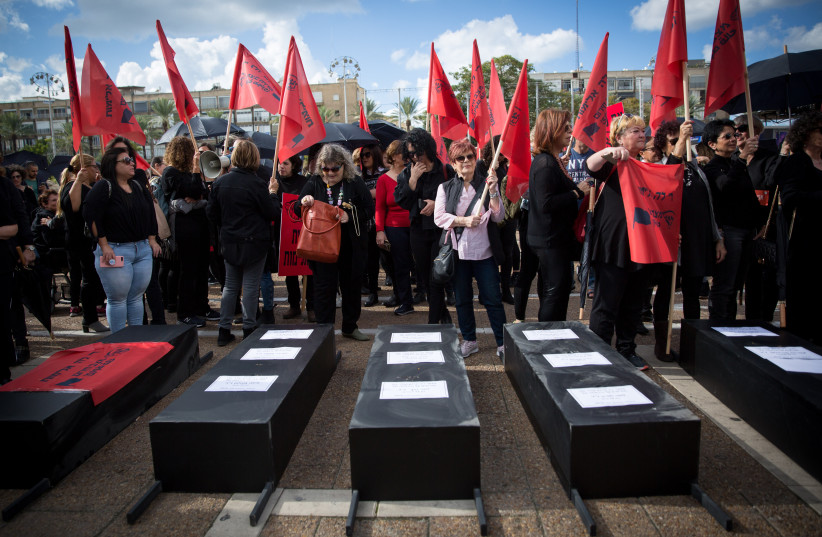A number of organizations urgently appealed in a letter on Wednesday to National Security Minister MK Itamar Ben-Gvir following an increase in violence against women in Israel with the fourth murder of a woman in the span of just two weeks taking place on Wednesday.
The letter urged for the finalization of legislation that would enact an electronic handcuff law that could be a saving grace for women living amongst their abusers.
In June 2022, the Public Security Committee passed a preliminary reading of a bill that, if it were to pass fully, would require confirmed domestic abusers for whom a protection order has been issued to wear electronic tracking bracelets.
The bill would allow the court to order the use of electronic restraints on a person who has committed a violent offense against a family member based on a risk assessment, thus allowing women affected by violence to feel safer and more protected.
"The recent murders oblige us to stop and realize that today there is a serious systemic failure and that Israel needs legislation that has been proven to be effective in other countries in order to guarantee women and children in the country a safe living environment," the letter to Ben-Gvir read.

"We demand that you take responsibility for hundreds of thousands of women and children living in Israel today under physical, economic and emotional terror," added the organizations in their letter. "We demand you do everything you can to prevent the next murder. On your desk sits the government bill of your ministry for electronic handcuffing that passed the first reading in the previous Knesset."
"You have the power to bring up the bill for continued legislation as early as next week. The electronic shackle will not only protect women but will turn the tide, and for women who are hiding and fear for their lives, it will allow law enforcement authorities to protect them.''
Femicide rising exponentially in Israel in 2022
A total of 24 women were murdered in femicide cases in Israel throughout 2022, averaging two femicide murders every month, the annual report from the Israel Observatory on Femicide (IOF) found.
The 2022 report marks a concerning increase in femicide cases, which are up by 50% from 2021, during which 16 women were murdered in femicide cases. Furthermore, despite the Arab sector only making up 21% of Israel's total population, 50% of women murdered in 2022 were Israeli-Arabs, the study found, indicating a disproportionate wave of gender violence within Arab society.
According to the Abraham Initiatives, 120 people in the Arab sector were murdered in 2022, 14 of them women. Of this number, 12 were killed in femicide cases and the remaining two died as the result of a stray bullet. The overall number of murders in the Arab Israeli sector in 2021 amounted to 125, with femicide cases accounting for eight of those deaths.
"We founded the association to give victims tools to demand justice, to enable the extraction of information that will be suitable for follow-up actions such as a complaint to the police, filing a civil lawsuit, contacting the media or any other action they want. All this, after spending months researching the fields of law enforcement, law, activism, and treatment."
Naama Feilchenfeld, Founder of Project Ma'at
Taking matters into their own hands
One recent organization is already taking strides to contribute to investigating cases of abuse online. At least 10 cases exposed by Project Ma'at have already blown up since the organization began operations at the beginning of last month.
The founder and director of the association, 27-year-old Naama Feilchenfeld, told Maariv that the organization was founded as a resource to help people seek justice when they're put in compromised positions like domestic abuse.
"We founded the association to give victims tools to demand justice, to enable the extraction of information that will be suitable for follow-up actions such as a complaint to the police, filing a civil lawsuit, contacting the media or any other action they want. All this, after spending months researching the fields of law enforcement, law, activism, and treatment," Feilchenfeld told Maariv.
"For this reason, we also launched a crowdfunding campaign on the giveback website to establish and operate the association over time, to allow victims of online sexual offenses to receive the assistance and the strength to act."
Abuse is increasingly widespread, and thanks to advancements by concerned citizens, new tools are developed to combat the harsh realities of increased femicide. Tens of thousands of people, particularly women and children of both genders, fall victim to abuse at the hands of online perpetrators.
"Those who hurt behind a screen, often hide under a cloak of anonymity and many times even manage to sustain the hurt in spaces to which the victims do not even have access. As a result, these perpetrators remain in the shadows, while the victims remain exposed for all to see, without an expiration date," Maariv reported.
Shira Silkoff and Tamar Uriel-Beeri contributed to this story.
